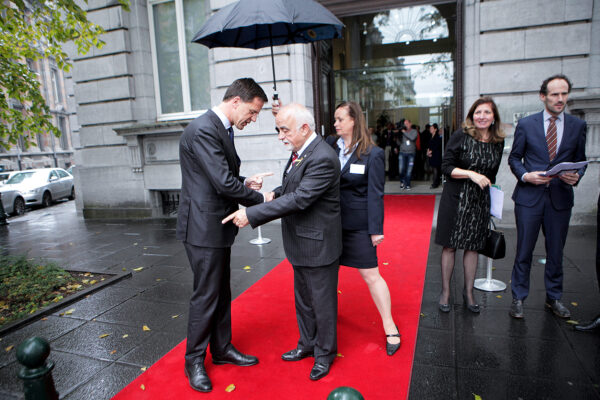
The Dutch prime minister, Mark Rutte, may have little choice but to ally with the left-wing Labor Party and Greens after next week’s provincial elections, even if his own and competing right-wing parties make gains.
Rutte’s liberal VVD (of which I am a member) is up in the polls, as is Geert Wilders’ Freedom Party (PVV) and the new Farmer-Citizen Movement (BBB).
JA21, a conservative offshoot of the far-right Forum for Democracy, would also win seats.
Their views on climate, farm and immigration policy could make it hard for Rutte to do deals with right-wing senators, who are elected by provincial deputies in May.
Liberal voters prefer deals with the right
Rutte’s coalition of liberal and Christian parties has a majority in the more powerful lower house of parliament, but not in the Senate. It isn’t projected to win one.
Most liberal party voters would look to BBB and JA21 for a majority: 59 percent, according to the news program EenVandaag. 22 percent would do a deal with the Labor Party and Greens.
Voters of the ruling D66 and Christian Union, by contrast, prefer Labor and the Greens to the conservative parties by a margin of ten to one.
The Christian Democrats, the fourth party in Rutte’s government, are split: 43 percent would seek the support of BBB and JA21, 35 percent of the Labor Party and Greens.
Rutte has so far relied on the left
NRC reports that since the last Senate election in 2019, left-parties have given the government a majority 44 times and the right only fifteen times.
Labor and the Greens supported a CO₂ tax on companies and an aviation tax of €26 per passenger.
Labor, but not the Greens, voted with the government to ratify the EU’s trade agreement with Canada.
Right-wing parties gave a majority to financial aid for the Dutch airline KLM during COVID-19.
Neither the center-left nor the populist right support the government’s agricultural reforms; the left because it feels the plan, which has a 2030 deadline, doesn’t go far enough, the right because it questions the need for cuts altogether.
BBB and JA21 are wary of compromise
BBB leader Caroline van der Plas has ruled out a coalition with the VVD so long as Rutte is prime minister. Her party competes with the Christian Democrats for rural votes.
Annabel Nanninga, the JA21 party leader in the Senate, who is a bigger threat to the VVD, has said there is “no room to negotiate” with her about forcing municipalities to shelter asylum seekers: a key government plan to cope with the high influx of migrants.
The two parties don’t leave a lot of wiggle room on farm policy either. Both oppose expropriating farmers who are unable or unwilling to cut emissions. They argue the solution to the Netherlands’ farm crisis is simple: just raise legal pollution limits.
The Netherlands has the highest livestock density in the EU by far, and as a result the highest emissions of ammonia (from manure). Mobility and industry emit nitrogen oxide. Both types of nitrogen are toxic to local plant- and wildlife.
The conservative parties also oppose reducing greenhouse gas emissions 55 percent by the end of this decade. Although, like the VVD, they support nuclear power as an alternative to fossil fuels.
Far right is beyond the pale
D66 has ruled out provincial coalitions with BBB and JA21.
Wilders’ PVV and the more radical Forum for Democracy, led by Thierry Baudet, are beyond the pale for all ruling parties, including the VVD.
Baudet lost most of his voters when he denied, before contracting, COVID-19 and continued to defend Vladimir Putin after the invasion of Ukraine.
What the left wants
The Labor Party and Greens want to legislate livestock reduction goals. D66 agree. The Christian parties and VVD prefer reduction goals for pollution, which would give technologies that capture and recycle ammonia a chance.
The ruling parties, including D66, have agreed to subsidize such innovations. Labor and the Greens only want to subsidize sustainable, including ecological, farming.
They would also make cuts in aviation and industry to reduce emissions of greenhouse gasses and nitrogen oxide, shutter the Netherlands’ four remaining coal power stations in the next two years and require landlords to install solar panels. Those measures should help achieve a 60-percent reduction in greenhouse gas emissions by 2030.
The parties have warned they would vote against any spending plan that cuts funding for elderly care and youth services. Senators haven’t rejected a government budget in 116 years.
VVD is up in Dutch heartland
Ipsos has the VVD up in Flevoland, Gelderland, North Brabant, North Holland, South Holland and Utrecht, the Netherlands’ central and western provinces which have three-quarters of the population.
The VVD would tie with the Christian Democrats in Zeeland, where more conservative Christian parties also poll well.
BBB is projected to place first in the northeastern provinces, although the Labor Party and far-left Socialists are strong in Groningen.
Wilders’ Freedom Party would win the election in his home province of Limburg in the south.
JA21 struggles to attract populists
Political scientist Matthijs Rooduijn writes that the Christian Democrats and VVD are losing voters to BBB and JA21, respectively.
But some disappointed Baudet voters are also returning to the VVD, canceling out defections to JA21. Others prefer Wilders’ PVV.
Het Financieele Dagblad reports that few voters are interested in JA21’s “respectable right”. It opposes further EU integration as well as an EU exit. It is for reining in immigration, but shies away from fake solutions like “closing the border”. Wilders doesn’t.
The motivating issue for many far-right voters in this election is the farm crisis. “Issue ownership matters,” Léonie de Jonge, who specializes in right-wing populism at the University of Groningen, told the same newspaper. “Many right-wing voters positively associate nitrogen with BBB. If that topic is dominant in the campaign, BBB benefits electorally.”
